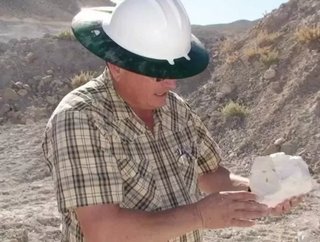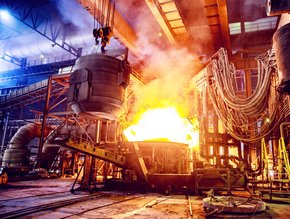EP Minerals: A Long History, A Modern Approach


Over the course of its storied 171-year life, EP Minerals has grown to become one of the more exciting and progressive industrial minerals companies in the United States—and it’s just getting better.
Founded in 1843 by Edgar and Stephen Conkling, the company originally went by the name Eagle. In 1916, Judge Oliver Picher merged the company with his own lead mining business to create Eagle-Picher Lead, the forerunner of modern day EP Minerals.
In the years since, the ambitious minerals company has acquired a series of highly valuable assets, such as a large diatomaceous earth (DE) deposit and factory in Clark, Nevada. In 1959, the company commissioned a DE producing plant in Lovelock, Nevada, which remains the largest DE producing plant in the world to this day.
That plant was upgraded in 1993 with a perlite expander, officially bringing the company into the perlite business. A new DE plant was built and commissioned in Vale, Oregon in 1985. In 2013, EP Minerals acquired the Moltan Company and with it additional mines and processing facilities in Nevada and Tennessee. Finally, in 2014, a new perlite facility was opened in Blair, Nebraska.
“We have six plants, close to 600 employees, plus or minus, and with that we sell all over the world and to about a hundred countries,” said Al Kaczanowski, vice president of marketing.
What They Do

EP Minerals doesn’t just sell its products in bulk. The company maintains a full-scale R&D department devoted to the development of cutting-edge, products, such as AXIS DE and AXIS Ceramic soil amendments, AgReady fertilizer carrier, DEsect insecticide and NXT-2 arsenic remediation product.
While perlite and absorbent clays are a large part of the company’s business, the cornerstone of their product offerings is DE. Though this material is regularly present in almost everyone’s life, its applications are often overlooked by those not involved in the sector.
“We sell DE into well over a hundred markets,” said Gregg Jones, president. “Our largest market is beer filtration, [which] would be a radically different process if DE wasn't available. Same thing goes for wine and juices.”
He added that DE is an essential component in high-quality paints, giving them a matte finish.
“We also sell it as an animal feed,” Jones said. “It’s used for filtration in biodiesel and in the oil and gas industry. It goes into catalysts, polishes, and even facial scrubs. It is used to filter corn syrup, citric acid, sugar, vegetable oil and soy sauce. It’s really a key ingredient in almost every food and beverage that gets filtered, and the reason they use it is that it's extremely versatile.”
The list goes on: maple syrup, fertilizers, pet litter, pharmaceuticals, swimming pool filters and more.
In addition to the many applications for EP Mineral’s DE, their absorbent clay is regularly used on baseball fields as well.
“The product that's used a lot on baseball fields is calcium bentonite. That's the red clay that goes around the field,” Jones said. “That's a product that's important in the United States, Caribbean countries and Japan.”
Who They Are
Many companies refer to themselves as “family companies” or having “family values,” but ultimately most fail to display those values. EP Minerals appears to be an exception.
“We've spent a lot of time defining what behaviors represent our culture today and what we want it to be in the future and we call that the EP Way,” Jones said. “These fundamentals [cover] how we interact with each other, how we treat our customers and how we make decisions on a daily basis, and we've just rolled that out across the whole organization. “
He added, “All of us, including me, have things to work on that we don't do so well today; leave your ego at the door, practice blameless problem solving and listen generously.”
How They’re Evolving
While EP Minerals’ facilities obviously don’t date back to the company’s origin 171 years ago, some of their infrastructure has become dated none-the-less. In an effort to maintain the quality of their products, the company announced a wide range of facilities upgrades, some of which have already been completed.
“We put a new dryer on one end of our kilns at Lovelock—a very big investment that improves the quality of the product coming out of the process,” Jones said. “A big investment in our Clark plant to make what we call our natural powders and some of the technology we put in there was new to us. It gives a better particle size distribution and better control of the product overall for the marketplace.”
The company recently finished construction on a perlite plant in Nebraska.
“We're shipping ore from Nevada—our own mine, our own perlite ore facility— and we're shipping it in railcars to Nebraska,” Jones said. “It gives us a nice centrally located perlite facility to supply what is a pretty big market in the Midwest.”
He added that among other improvements, the company is also investing heavily in their exploration group to facilitate the discovery of new ore deposits. Among those investments are technologies that improve their overall drilling ability.
It would be wrong in every sense of the expression to refer to the veteran company as an up-and-comer or say they were “on the path” to success—they’ve been there for some time. Rather, it’s important to point out all the ways they’re already present in the market around us, and that they have no intentions of slowing down.
“I think it's worth noting that a lot of businesses are selling commodities and they don't have a lot of interaction with the end-use markets,” Jones said. “One thing that we've always been focused on, and its part of our growth story, is not only understanding our markets that we sell into and understanding the value that our products contribute to those applications, but working on new applications. That's what's always gotten me interested in the business: the constant opportunity to find something new and figure out how we can sell into a new space.”






